I. Introduction
Have you ever thought about how artificial intelligence (AI) can affect your digital marketing campaigns? What AI marketing tools should you use? Companies are always looking for fresh advertising approaches as digital technology develops. AI marketing is one such development; this term describes the use of AI technology to boost the efficiency and productivity of commercial campaigns.
AI marketers automate, improve, and personalize marketing campaigns by using machine learning algorithms, natural language processing, and other cutting-edge technologies. AI marketing tools can help marketers because they can look at customer data, predict how customers will act, and find patterns.
Artificial intelligence (AI) in advertising has become crucial in the modern digital era. Businesses are finding it harder and harder to process and analyze this growing mountain of data by hand to come to valuable conclusions. AI marketing provides a remedy for this issue by enabling enterprises to leverage machine learning to enhance customer engagement, refine marketing strategies, and improve ROI.
Businesses can increase customer satisfaction and loyalty by using AI marketing tools to create and distribute more relevant content to each customer’s needs. To do this, AI marketing is quickly becoming an essential tool for businesses to set themselves apart from the competition and adapt to their customers’ changing wants and needs.
II. Benefits of AI Marketing
Artificial intelligence is affecting us in many ways and fields. Marketing campaigns that make use of AI have many advantages for companies. Consider the following five benefits of using AI in advertising:
A. Increased efficiency and accuracy in data analysis
Using AI-powered marketing tools, businesses can quickly and accurately sort through vast amounts of data to find patterns in their customers’ habits, interests, and buying habits.
Artificial intelligence lets companies track customer activity across all their channels and touchpoints. This makes their marketing efforts more effective and gets more of their target audience to participate.
B. Personalized marketing campaigns
Using AI in this sector has a lot of benefits, but one of the most important is that it makes it easier to market to specific demographics and interests.
Artificial intelligence (AI) powered tools can analyze customer behavior to spot trends and make tailored recommendations for each customer, leading to more successful and exciting marketing initiatives.
C. Improved customer segmentation and targeting
With the help of AI-powered tools that can divide customers into groups based on their demographics, behavior, and other factors, businesses can send more relevant and personalized messages to specific groups of customers.
Because of this, targeting is improved, and conversion rates go up.
D. Real-time customer interaction and engagement
Artificial intelligence (AI) enables businesses to interact with customers in real-time, tailoring their suggestions, deals, and assistance to each individual.
With the help of AI, chatbots and virtual assistants can now answer customer questions and make suggestions based on what the customer has done in the past. This makes the customer’s experience more interactive and fun.
E. Enhanced customer experience and loyalty
Organizations can increase customer satisfaction and loyalty by making their services fit the needs and interests of each customer.
When businesses use AI to track what their customers do and what they like, they can tailor their service at every point of contact. This makes the interaction smoother and more enjoyable.
In conclusion, artificial intelligence (AI) in marketing has many advantages, such as boosting productivity and precision in data analysis and delighting and retaining customers. Businesses can learn more about their customer’s habits and preferences with the help of AI-powered tools and technologies, allowing them to create more relevant and exciting advertising campaigns.
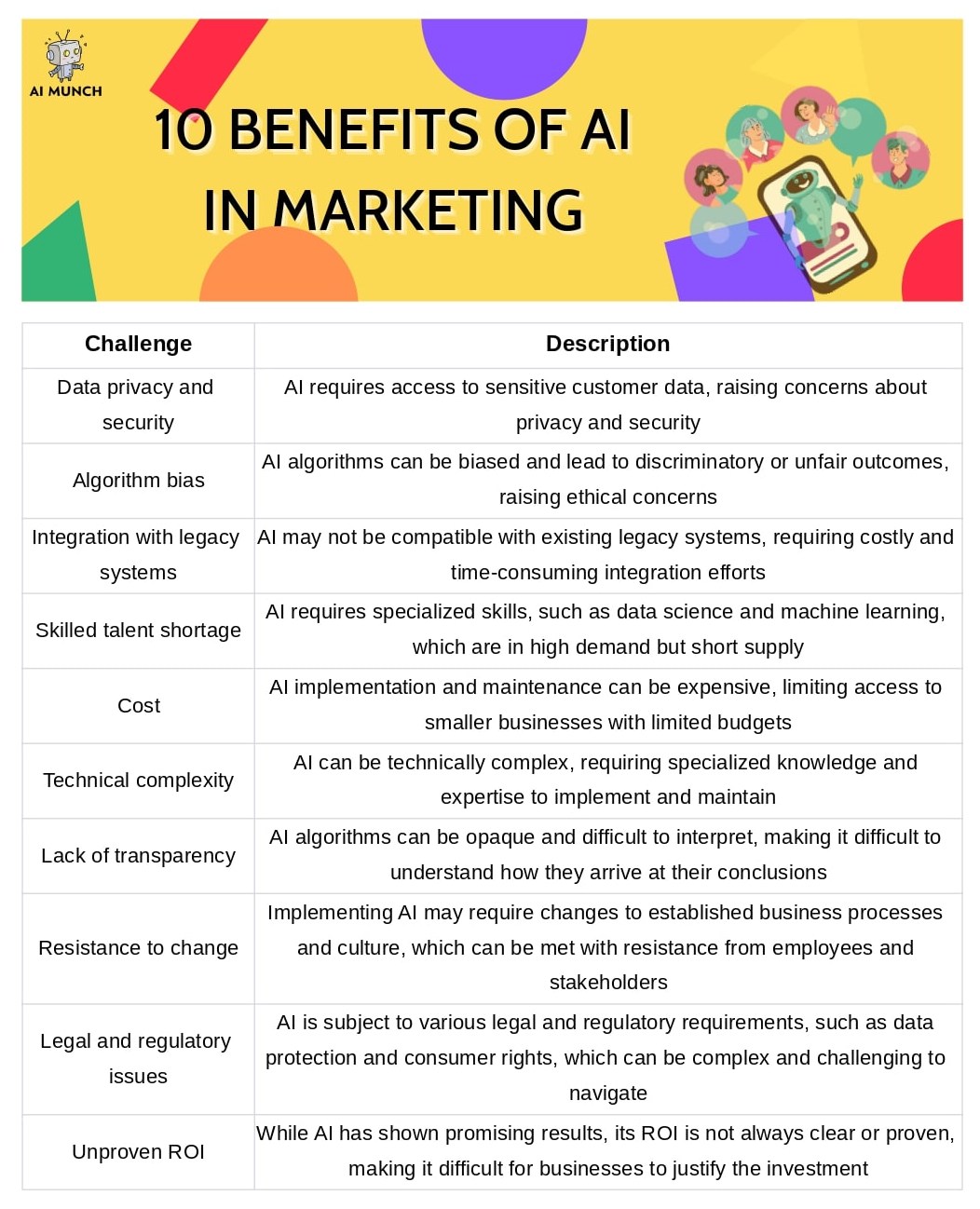
III. How to Use AI for Marketing Purposes
There are many ways in which AI can be used to boost promotional initiatives. Here are four examples of how companies can put AI to use in their advertising:
A. Data collection and analysis
Data collection and analysis is a crucial application of artificial intelligence in marketing.
Businesses can learn about their customer’s habits and preferences by collecting and analyzing data from multiple channels, such as social media, web analytics, and customer databases.
AI-powered tools let businesses quickly and accurately look at vast amounts of data to find patterns and trends that can be used to guide advertising campaigns.
B. Predictive analytics
Predictive analytics tries to figure out how people will act in the future by using algorithms for machine learning.
With the help of customer data analysis, companies can predict what their customers will do next and create strategic campaigns to influence their buying decisions.
This could help people who want to get the most out of their marketing dollars and focus on the most profitable opportunities.
C. Chatbots and virtual assistants
Powered by artificial intelligence (AI), chatbots and virtual assistants interact with users in real-time.
Businesses can make the customer experience more exciting and interactive by answering questions and making specific suggestions.
Marketers can use the information gleaned from interactions with chatbots to target their campaigns better.
D. Personalization and recommendation engines
Personalization and recommendation engines powered by artificial intelligence can design unique and engaging customer interactions.
Businesses can improve the effectiveness of their marketing by tailoring their recommendations to each customer by analyzing their data. Both email and website marketing can benefit from the use of personalization and recommendation engines.
In conclusion, AI can be used for marketing purposes, such as data collection and analysis, predictive analytics, chatbots and virtual assistants, and personalization and recommendation engines. Businesses can improve their marketing, sales, and customer service, all thanks to AI’s ability to help them better understand customer behavior.
IV. AI Marketing Use Cases
Several sectors have seen rising interest in applying AI to their marketing efforts. Let’s look at five examples of how artificial intelligence is being used in advertising:
A. E-commerce and retail
E-commerce and brick-and-mortar stores alike are implementing AI-powered recommendation systems to serve customers better.
With the help of AI-powered recommendation engines, online stores can track their customers’ preferences and tailor their product suggestions to them.
Artificial intelligence can also automate inventory management, predict consumer demand, and maximize profit. Amazon has used AI for years; more than 500k robots work in its warehouse.
B. Banking and finance
AI in finance has tons of benefits. Banks and financial institutions use AI to boost customer support and safeguard their operations.
AI-powered chatbots can answer questions from customers and suggest specific financial services that might meet their needs.
Additionally, AI can sniff out fraudulent actions and stop security breaches.
C. Healthcare
In healthcare, AI is used to enhance patient outcomes and the quality of care provided.
As a result of the analysis of patient data, AI-powered tools can make predictions about health risks and recommend individualized treatments.
Appointment scheduling and medical record keeping are just two examples of administrative tasks that could be automated with the help of AI.
D. Travel and hospitality
AI makes more tailored suggestions for guests in the hospitality and tourism industries.
AI-powered recommendation engines can make personalized suggestions for hotels and attractions to customers.
Booking and reservation management are two customer service activities that AI could automate.
E. Entertainment and media
AI is used in the entertainment and media industries to make more personalized content and improve the audience’s experience.
Recommendation engines powered by AI can make recommendations based on users’ past actions and likes.
Automating content production with AI can be used to create tailored news articles and social media updates.
To sum up, AI is being implemented in many sectors to boost customer service quality, streamline internal processes, and generate more income. Artificial intelligence applications in advertising span a wide range of industries, from e-commerce and retail to healthcare and the arts. Businesses can learn more about their customer’s habits and preferences with the help of AI-powered tools and technologies, allowing them to create more relevant and exciting advertising campaigns.
V. 10 AI Marketing Tools
Google also offers AI solutions for marketing. As AI marketing grows in popularity, more tools have come out to help businesses improve their marketing. Here are 10 AI marketing tools that are worth considering:
Persado: AI-powered copywriting and message optimization
Persado uses AI to analyze marketing messages and identify the most effective language and wording for different target audiences. The platform can help businesses create more effective messaging across various channels, including email, social media, and web pages.
Albert: AI-powered advertising and media buying platform
Albert uses AI to run and improve digital advertising campaigns on Google, Facebook, and Instagram, among other places. The platform uses real-time data to make campaign decisions and optimize targeting and bidding strategies.
Amplero: AI-powered marketing automation and optimization
Amplero uses AI to improve how it interacts with customers through email, SMS, social media, and other channels. The platform uses machine learning to analyze customer behavior and deliver personalized recommendations and messages in real-time.
Optimizely: AI-powered experimentation and optimization platform
Optimizely uses AI to optimize website and app experiences based on customer behavior and preferences. The platform can be used to run A/B tests, personalize content, and optimize user flows and conversions.
Blueshift: AI-powered customer data platform and personalization engine
Blueshift uses AI to study how customers act and sends personalized messages and suggestions through many channels. The platform can be used to divide customers into groups, automate marketing campaigns, and look at how well those campaigns are doing.
Crayon: AI-powered market and competitive intelligence platform
Crayon uses AI to analyze the market and competitive data and provide business insights. The platform can be used to monitor competitor activity, track pricing trends, and analyze customer sentiment.
Cortex: AI-powered social media and content marketing platform
Cortex uses AI to analyze social media and content data and provide content creation and distribution recommendations. The platform can optimize social media campaigns, analyze content performance, and identify influencers.
Acquisio: AI-powered digital advertising and optimization platform
Acquisio uses AI to manage and optimize digital advertising campaigns across multiple channels. The platform can be used to automate bidding, optimize targeting, and track campaign performance.
Adext: AI-powered digital advertising platform for small businesses
Adext uses AI to optimize digital advertising campaigns for small businesses. Using real-time data, the platform can be used to automate bidding and targeting and improve the performance of ads.
Drift: AI-powered conversational marketing platform
Drift uses AI to analyze customer behavior and deliver personalized messaging and recommendations in real-time. The platform can automate customer service tasks, such as answering frequently asked questions and scheduling appointments.
In conclusion, these 10 AI marketing tools can help businesses improve their marketing efforts, from optimizing ad campaigns to creating personalized messaging and content. By using AI-powered tools and technologies, companies can learn a lot about how customers act and what they like, which helps them create more effective and exciting marketing campaigns.
VI. Challenges and Solutions
While AI marketing offers many benefits, there are also some challenges to consider. Here are some of the main challenges facing AI marketing and potential solutions:
- Data privacy and security: One of the biggest challenges facing AI marketing is ensuring the privacy and security of customer data. To address this challenge, businesses can use encryption and other security measures to protect customer data, and ensure compliance with data protection laws such as GDPR.
- Algorithm bias: AI algorithms can be biased due to the data they are trained on, which can lead to discriminatory outcomes and impact marketing effectiveness. To address this challenge, businesses can work to identify and remove biases in their data and algorithms, and ensure diversity and inclusivity in their data sources.
- Integration with legacy systems: Integrating AI into existing legacy systems can be challenging, and may require significant investment in new technology and infrastructure. To address this challenge, businesses can adopt a phased approach to implementation, starting with smaller projects and gradually scaling up as they gain experience and confidence.
- Skilled talent shortage: The demand for AI marketing talent is high, but the supply of skilled professionals is limited, which can make it difficult for businesses to find and retain the right talent. To address this challenge, businesses can invest in training and development programs to upskill existing employees, and partner with universities and other organizations to recruit and train new talent.
- Solutions to address challenges in AI marketing: Implementing a robust data privacy and security strategy, Regularly auditing AI algorithms for bias, Gradual integration of AI technology and infrastructure, Investing in training and development programs for existing employees and recruiting new talent
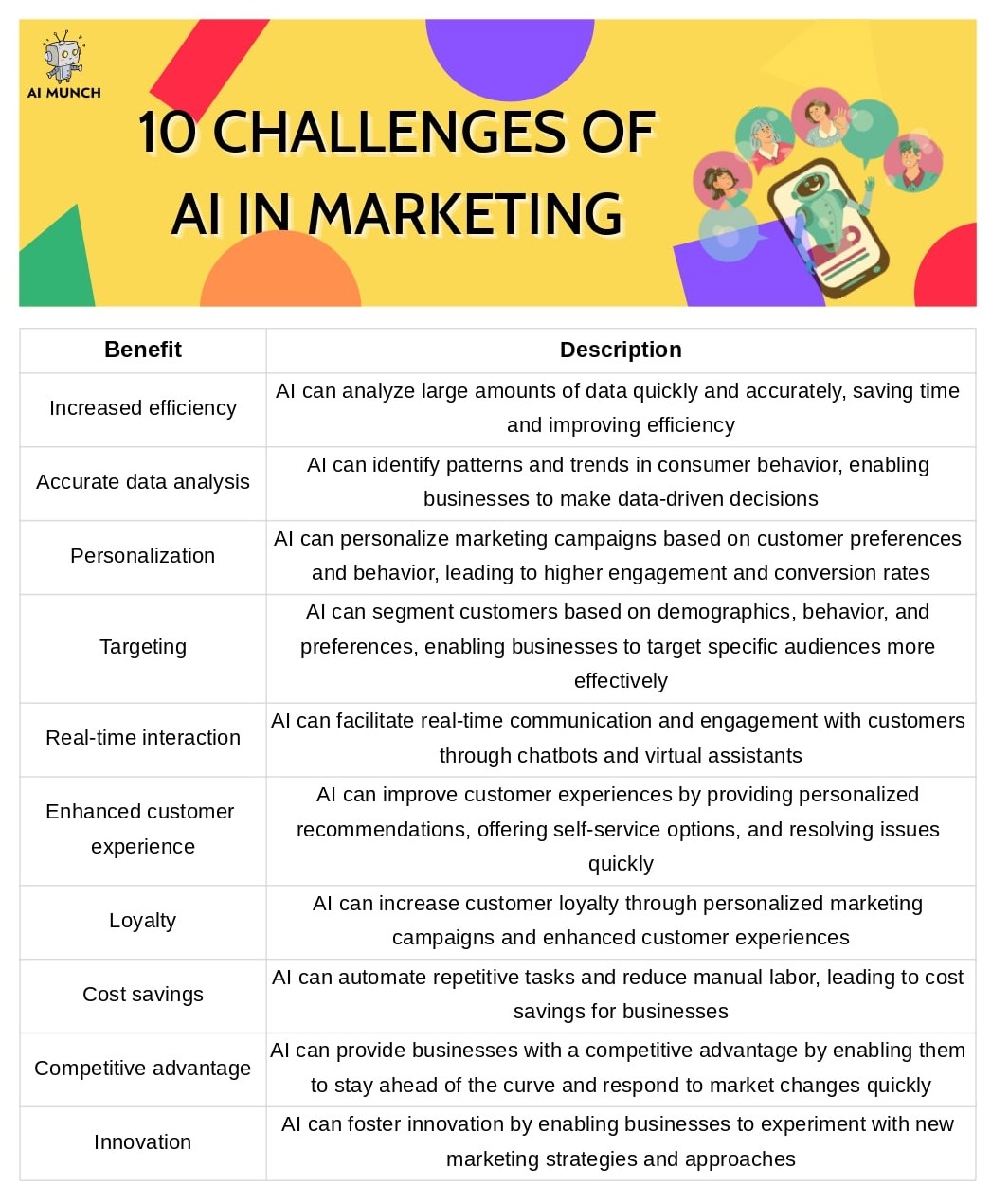
VII. Conclusion
In conclusion, AI-powered marketing has many benefits for businesses, such as increased efficiency, targeted marketing efforts, accurate customer segmentation, and customer interactions. Data privacy and security, algorithmic bias, integration with legacy systems, and a lack of skilled talent are just some of the obstacles that must be overcome. Strong data privacy and security strategies, auditing algorithms for bias, and employee training and development programs are all options for companies looking to meet these challenges head-on. The future of AI marketing looks promising, and businesses that adopt this technology now will have a leg up on the competition in the digital age.
FAQs AI Marketing
Artificial intelligence (AI) is used in marketing to analyze massive amounts of data, automate mundane tasks, and create more customized experiences for each customer. It can help find trends in consumer behavior, tailor product suggestions to individual needs, and fine-tune marketing efforts.
Any business that wants to stand out in today’s digital market should invest in AI marketing. Artificial intelligence can help companies to streamline operations, tailor advertising efforts, and provide superior service to customers. But before making a decision, companies should weigh the pros and cons of investing in AI marketing.
AI marketing tools can assist businesses with data analysis, routine task automation, and one-on-one customer interactions. Persado is an example of an AI copywriting agency, Albert is an example of an AI media buying tool, and Blueshift is an example of an AI customer data platform and personalization engine.
Artificial intelligence in marketing will likely play a more significant role in the industry. Businesses that invest in AI now stand a good chance of gaining a competitive edge. Artificial intelligence can help companies to streamline operations, tailor advertising efforts, and provide superior service to customers.
There is no single owner of AI marketing, as it is a technology that businesses can use across different industries and sectors. However, some companies specialize in developing and providing AI marketing solutions and tools, such as Persado, Albert, and Blueshift.
AI in marketing can boost profits in several ways, including more targeted advertising and happier customers. In order to increase customer satisfaction and loyalty, businesses can use AI to understand customer preferences better, make tailored product suggestions, and fine-tune marketing efforts.
Do you want to read more? Check out these articles.
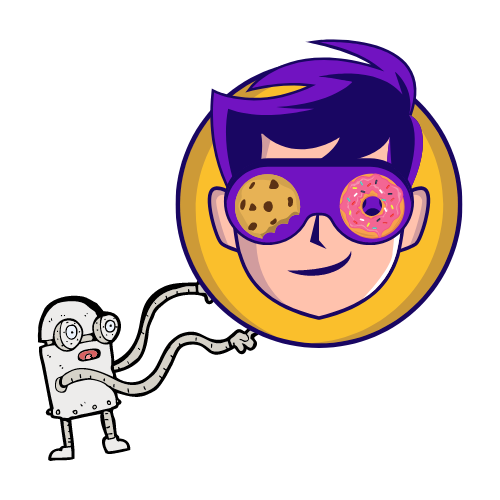


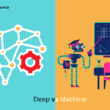



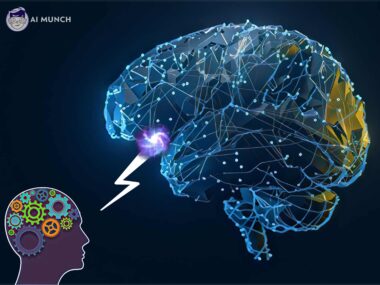



8 comments